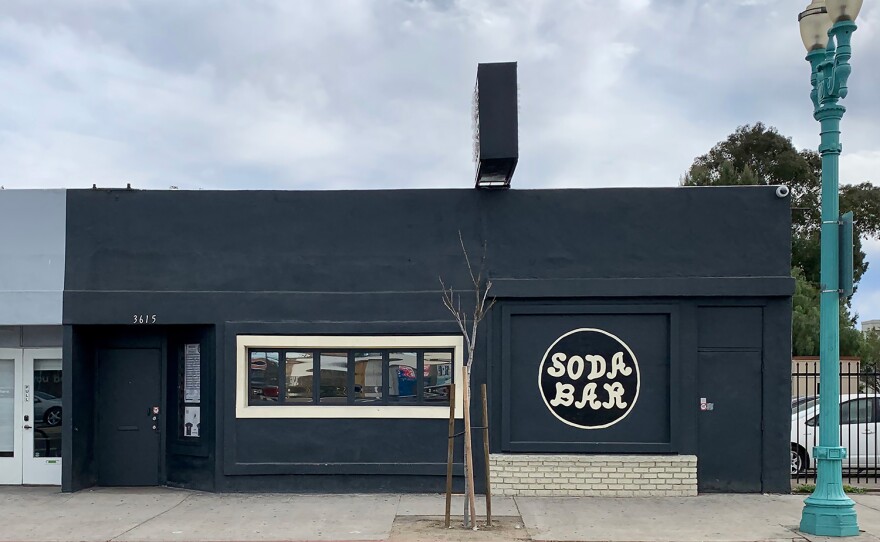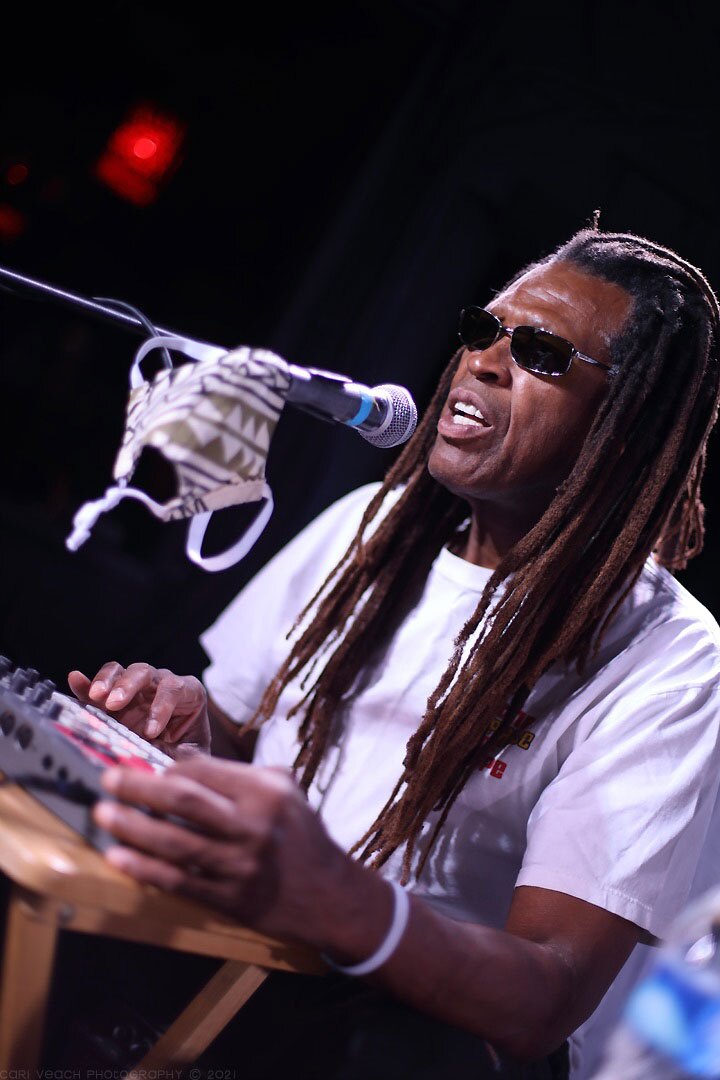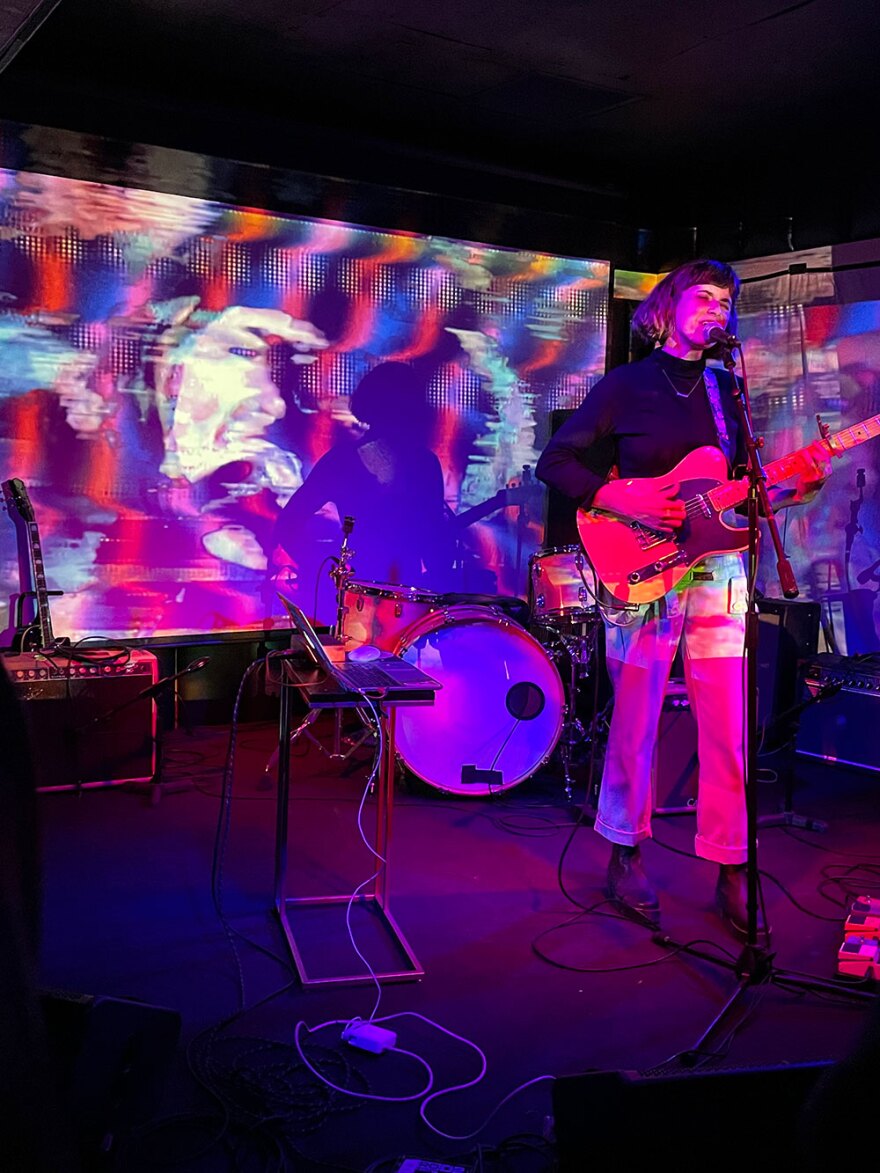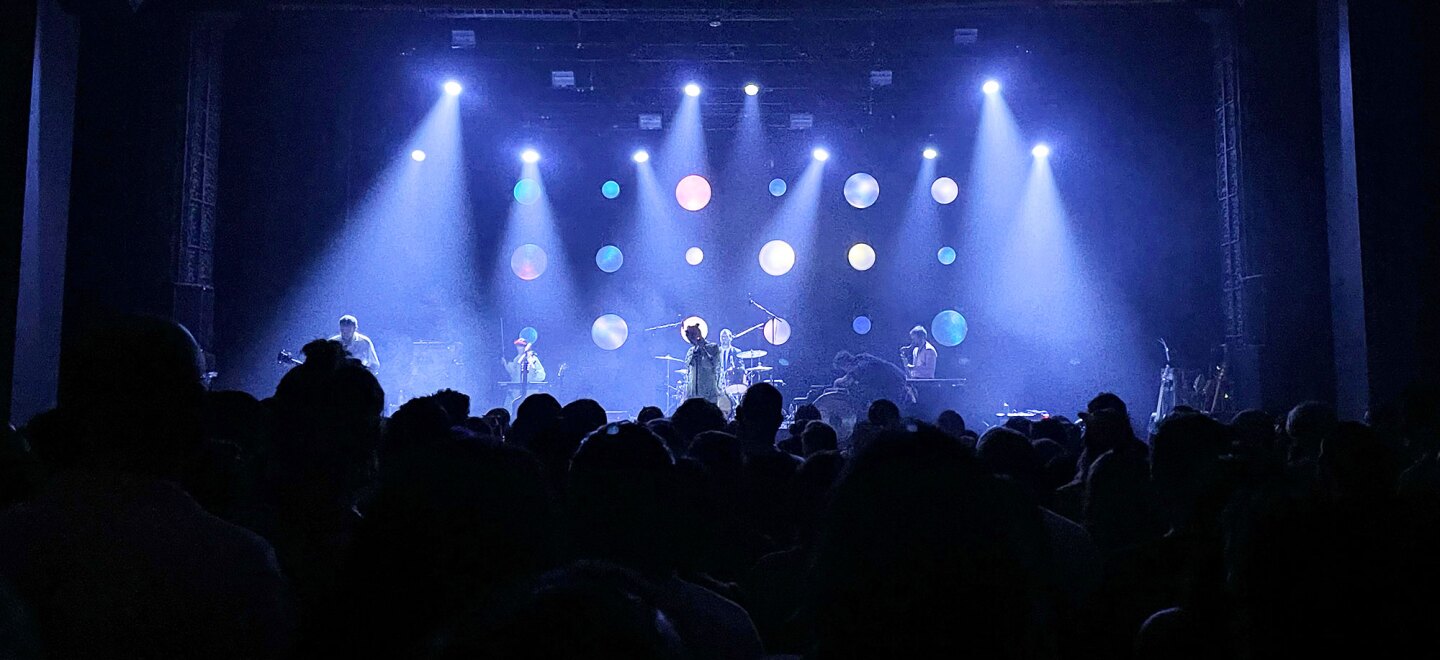In the final installment of our series exploring two years of the pandemic's impact on the performing arts industry, we look at the live music scene and local music venues, with stories from a venue owner, security staff and a performer.
Two years ago this month, San Diego's vibrant live music industry screeched to a halt. Venues were shuttered and bands could no longer tour, or in some cases even practice together. Since reopening last summer, venues, performers and staff had to juggle evolving restrictions and more cancellations — plus added job duties for bouncers and bartenders in enforcing public health policies.'Omicron was a real curveball'
Angie Ollman is co-owner of City Heights music venue Soda Bar. The 21-and-up venue has a capacity of 230 guests, and the intimate space is only open when there is a show. So, in March of 2020, when shows were canceled, revenue dried up. We checked in with her about the ongoing effect of the loss of shows and changing restrictions on the business.
"It's been really challenging, and it's been interesting, just the way the challenges have shifted over the time. Obviously, being fully closed was primarily just a financial challenge. Making ends meet while we had nothing coming in to support us, and, now that we're reopened, it's a whole new wave of challenges as things are sort of constantly shifting and we're ever adjusting to changing health guidelines and all the disruptions, but steadily improving now. But yeah, it's just required so much flexibility and creativity," Ollman said.

Soda Bar was one of the first venues in San Diego last year to require proof of vaccination or a negative COVID-19 test to enter. Ollman said the vast majority of patrons were happy with the enforcement.
RELATED: San Diego Venues Respond To Rise In COVID Cases By Implementing New Policies
"We got a lot of people thanking us for it. Of course, as everyone knows, there were definitely people that were unhappy about it, and, unfortunately, those people tended to be the most vocal. And, in the early days, our staff really took some heat for it, which was really hard and felt very unfair to them. So that was tough, and we were so early to do it that we didn't have a lot to look to for guidance for how to best implement it and what to do in the beginning. So we really felt like we were winging it, and that was definitely hard. It really helped once it became sort of an industry standard and people just got used to it because it was happening at every venue around that made it much easier," Ollman said.
Now that case rates are lowering across the county, we asked if recent months have seen a change, or whether audiences are still largely staying home.
"I think we are finally hitting a point where it's starting to feel like it's getting back to normal. Bands are hitting the road at near pre-pandemic levels, which is great, and our shows have been busy and the mood feels good and fun. I think there's been a real shift in the last couple of weeks that it felt great. Obviously, omicron was a real curveball, and so that really derailed what was sort of ramping up going into December," Ollman said. "We had a lot of cancellations, and that really slowed things down a lot. And we feel like we've really turned a corner from that, and it feels great. It's really been a welcome change to feel the clouds parting. Some bit of normalcy."'Communication is the hardest part of the whole thing'
For front-of-house workers, such as bouncers, security and door staff, the past two years have meant constant changes and new job requirements. Ted Washington works security and is a production manager at the Casbah venue in San Diego.

"When the pandemic hit and we had to shut down, I can say right off the bat that, in the very beginning, there was no work. We had nothing to do. We did give the bar a makeover during that time period, because, for the first time in many years I had worked at the Casbah, we had time to actually do things like paint and fix things inside the club. We then went on to put together some streaming shows, which were great for the bands, because bands were looking to do things, especially the local bands. And, as a musician, you want to play, and that's what you want to do.
"The hardest part of reopening so far has been trying to find a routine for the customers when they come to the door, the idea that they have to have their vaccination proof with them or a negative test. We have to make that clear before they get to the door, because if you don't make that clear and known before they actually get to the door, when they get to the door, there's always going to be a problem, because they're going to say: 'I didn't know I needed to have that. I don't have that with me. I have a ticket, yet I don't have those items.' This isn't right, and not so much that I feel bad about it as much as you just feel like, if only we could get this information into their hands or into their minds earlier before they actually show up at the door.
"The rules, I'll say, kept changing so much that you just didn't know what you were doing from week to week, day to day. It became really an issue. Like I'm saying, communication is the hardest part of the whole thing. And so the state was not really communicating with the venues exactly what we were mandated to do. And it made it difficult, especially in the very beginning when we first opened up, you're like: 'OK, here are the rules. You got to do this. You've got to do that. You must do this, you must do that.' And you didn't know what you were telling people to do, because you didn't know what you had to tell people to do. That was the hardest part.
"The thing is, with bands, especially touring acts, if they lose a member or someone gets sick while they're on tour, they're going to lose money. The touring process requires a certain investment of money in the beginning, especially investment of money and time. Just so you're carving out a calendar for yourself and you got to make this tour. You can't have people getting sick. So, for the bands, the bands want as many of the safeguards as they can possibly have. On the other side of that, the fans are thinking: 'Hey, look, I am a fan and I'm not going to try to endanger you. I want to just come see the show. And I don't know why you need all these excessive safeguards.' They don't see it from the side of the band."
—Ted Washington, security/production at the Casbah
'We're all just kind of wondering how we ever did this in the first place'
For some performers, when things began to reopen, some of the new challenges were surprising. Singer-songwriter Julianna Zachariou lives in San Diego but spoke to us while on the road, on tour.

"Everything shut down while I was on my first ever tour. Booked myself, and it was going great. And I just remember I had heard about stuff in December, and then we were off on the road in March. I was following the news and it was one of those things where I was like, maybe it won't quite hit us. I just remember being able to get hand sanitizer on the road, and that seemed to be the only thing that we were trying to keep on us so that we didn't get sick. And then everything just kind of stopped and we came home and I didn't work again for like a year and a half.
"But an interesting thing that me and a lot of other people are experiencing getting back on the road — because I'm on the road now and I had another tour back in October — I think it was my nervous system really needed a recalibration. After a year and a half of being at home, I didn't know how to handle stage nerves. I didn't remember how to eat when I felt nervous. I have to schedule these things in so that I have energy.
"My first big show back was in LA, and I played an opening set and I played in my friend Caroline Kingsbury's band. And I had to take a break on stage for my set, and I've never had to do that. I just kind of told everybody, I'm feeling a little overwhelmed. I'm just going to need to sit and play guitar for a second and calm down because I felt like, I don't know, it felt like somebody had unscrewed my head and I was just like a raw nerve just pumping out sound. And I didn't know how to harness it. A lot more preparation has gone into my mental health and making sure that I eat, making sure that I manage my stress. I just don't have the same capacity that I used to. I've heard this kind of across the board. We're all just kind of wondering how we ever did this in the first place. This type of schedule.
"We have people in this band right now who are working remotely and also are able to tour. So job security can also be part of your life as a musician. Just because everything went remote. I don't have another job right now, but I'm confident that , if I needed to do both, there'd be way more options for me, which was just not a thing before.
"We'd all rather be home. That's a very new thing. Just learning that stuff is better than home is something that I can't even — I'm trying to learn again. Shows are great. I think we just all forgot how great they were."
—Julianna Zachariou, musician








